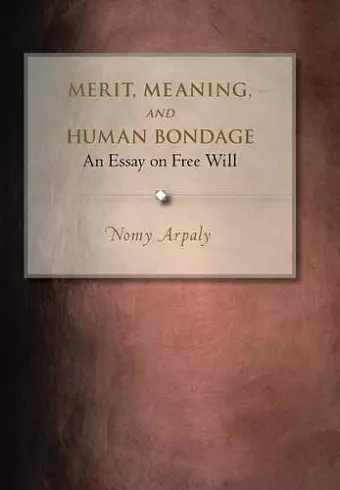Merit, Meaning, and Human Bondage
An Essay on Free Will
Format:Hardback
Publisher:Princeton University Press
Published:22nd Aug '06
Should be back in stock very soon

This book is clearly and compellingly written and highly original. Arpaly does a really excellent job of situating herself within the literature on free will and accounts of praise and blame. I also personally like that she does not depend on the dubious idea of 'reactive attitudes' to ground her account. I find her approach refreshingly sensible. This is an excellent book. -- Julia Driver, Dartmouth College Arpaly's book is fresh, novel, and original, making intriguing and suggestive contributions to our understanding of basic and important issues. Her use of examples from literature and from psychological theorizing about mental illness helps significantly to broaden and deepen the philosophical discussion. She is distinctive for avoiding the abstract and sometimes sterile hypothetical examples of action-theorists in favor of more colorful and realistic examples from a broad variety of contexts. She offers helpful insights about various issues, and an overall picture that is attractive and distinctive. -- John Martin Fischer, University of California, Riverside
Argues that a deterministic world does not preclude moral responsibility, rationality, and love - in short, meaningful lives - but that there would still be something lamentable about a deterministic world.Perhaps everything we think, feel, and do is determined, and humans--like stones or clouds--are slaves to the laws of nature. Would that be a terrible state? Philosophers who take the incompatibilist position think so, arguing that a deterministic world would be one without moral responsibility and perhaps without true love, meaningful art, and real rationality. But compatibilists and semicompatibilists argue that determinism need not worry us. As long as our actions stem, in an appropriate way, from us, or respond in some way to reasons, our actions are meaningful and can be judged on their moral (or other) merit. In this highly original work, Nomy Arpaly argues that a deterministic world does not preclude moral responsibility, rationality, and love--in short, meaningful lives--but that there would still be something lamentable about a deterministic world. A person may respond well to reasons, and her actions may faithfully reflect her true self or values, but she may still feel that she is not free. Arpaly argues that compatibilists and semicompatibilists are wrong to dismiss this feeling--for which there are no philosophical consolations--as philosophically irrelevant. On the way to this bittersweet conclusion, Arpaly sets forth surprising theories about acting for reasons, the widely accepted idea that "ought implies can," moral blame, and more.
"This volume is a very interesting and clearly written contribution to the literature on free will and determinism."--Choice
ISBN: 9780691124339
Dimensions: unknown
Weight: 369g
160 pages